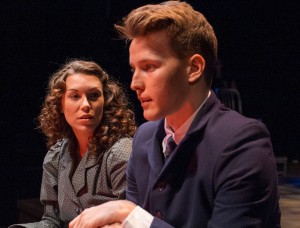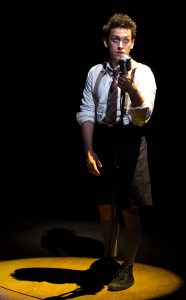Cygnet Theatre’s Fair ‘Spring Awakening’ Isn’t the Sum of Its Parts
If my cast recording of Spring Awakening were vinyl, I would have thrown it out about a thousand years ago for wear and tear. As it is, it sits pristinely on my iTunes, where I’ve accessed it exactly one million times a day since the summer of 2008. That’s when the enormously successful Broadway entry came to San Diego before it set out on tour—in all that time, the music hasn’t begun to let go.
I’m listening to it right now as I revisit Cygnet Theatre’s current take on the show, a wholly unsurprising choice for this performance-worldly company. Cygnet artistic director Sean Murray seeks to fuel the city’s familiarity with the piece (it first saw the light of day here in the 1990s as a workshop production at La Jolla Playhouse, and San Diego’s Actors Conservatory Theatre mounted it in 2011), and he directs it with his typical earnestness and sense of industry.
By all means, please see this edition of one of modern American theater’s most wonderful and highly unlikely success stories—just understand that accord doesn’t necessarily translate as authenticity.

Wendla Bergmann (Taylor Aldrich) and Melchior Gabor (Dave Thomas Brown) are the pictures of befuddlement and hope. Photos by Daren Scott.
This tale of teenage angst, and the singular horrors it can and does yield, plays out across the globe every day, just as it did in 1891, when Germany’s Benjamin Franklin Wedekind charted it under the name Spring’s Awakening. Homosexuality, masturbation and the specter of child sexual abuse hang heavy over Wedekind’s drama on cascading hormones and a cadre of parents whose Victorianism prevents them from acknowledging the biology of – shhhhh! – sex.
At the center is wunderkind student Melchior Gabor, whose starchy faculty dislikes him amid his search for answers to life’s colossal questions. He’ll lose two chums to the ghastly grit of day, one beset with disturbing sexual fantasies (and bad grades, a pivotal one engineered by his sadistic teachers) and the other, whom he likely impregnated, the victim of an abortion gone bad. The larger world and its perceived catastrophes, fueled by a legion of hopelessly doctrinaire adults (Melchior calls it a “parentocracy”), makes a hideous home planet.
Wedekind had tapped (nay, nearly severed) a nerve in those for whom protection of public morals is a self-appointed task—the play didn’t premiere until 1906 and didn’t receive its first turn in English until 1917. Ninety years later, the play would become the toast of Broadway and win eight Tonys, including Best Musical. The themes are timeless, but behind Steven Sater’s book and lyrics and Duncan Sheik’s outstanding score, the present has yielded those themes the light of day.
But the Cygnet entry lacks an almost celebratory quality that such enlightenment should fuel. The display of teen angst, while clearly evident in the kids’ speeches, often falls short in the situations those speeches are designed to create; the music demands a life of its own; and choreographers Michael Mizerany and Katie Whalley Banville may have run out of ideas somewhere along the way (on many occasions, when all else fails, the dancers stomp their feet in time to the tune). It’s true the cast has a gargantuan task, as adults are asked to play kids some eight to ten years their junior—but any full production of Spring Awakening is always saddled with that dilemma. You make the best of it and tend to bigger matters, like creating interactions that serve as more than bridges to the songs.

Moritz Stiefel (Charles Evans Jr.) doesn’t do sadness–he’ll see to that through his suicide.
Dave Thomas Brown’s Melchior has a nice histrionic range—his Melky is an agreeable, fair-haired kid who’s not afraid to defend what’s important, and Brown illustrates this amid a solid lower singing register, especially in the touching “Those You’ve Known.” Taylor Aldrich succeeds in pretty much the same way with her Wendla Bergmann, Melchior’s love interest. Her opening scene, in which she begs her mom for a little insight into the birds and bees, is absolutely precious. The melancholy “Don’t Do Sadness” defines suicidal Moritz Stiefel—but Charles Evans Jr. hasn’t yet defined Moritz’s readability in the show’s most uneven performance.
Katy Tang and Amy Perkins are blessed with uncommon voices, but the household sexual abuse their Ilse and Martha endure (“The Dark I Know Well”) calls for more edge from the characters. Matt Thompson and Debra Wanger succeed as all the adults; Thompson gets an awful lot out of Moritz’s grieving father without saying a word.
Music director Terry O’Donnell’s fare and Matt Lescault-Wood’s sound are uniformly overengineered; the self-discovery ode “Touch Me” and the comic-relief “Totally Fucked” come across in spite of it. Shirley Pierson’s costumes are at their best on the girls, whose personalities are well-defined among the hues. Chris Rynne’s lights tend to overilluminate certain sequences; meanwhile, Ryan Grossheim’s set features this marvelous wood sculpture overhang, a roily vessel for the children’s entrapment. Outstanding touch.

Whatever else it may lack, Cygnet’s ‘Spring Awakening’ is abundantly energetic.
Listening to my cast CD makes me think of my 2009 interview with Lauren Pritchard, Broadway’s original Ilse; our conversation eventually turned to versatility as a musical cornerstone. “Think about it,” she said. “When you listen to your favorite singer or favorite band or whatever it is, you don’t want to hear the same album over and over. It’s fun to try avenues that you can still really be connected with.”
The same approach applies to the theater. While the original Spring Awakening addresses the storms of adolescence on a global scale with sex at its center, this show, vigorous as it is, assigns each of those storms the same level of intensity among wildly different people. It diminishes Pritchard’s fun connectedness amid its lack of reference points—one size, especially in the theater, is never designed to fit all.
On Monday, March 24, Cygnet will welcome Sheik for a talk on his music and his take on musical theater. The event starts at 7:30, a half-hour earlier than the normal curtain time.
This review is based on the opening-night production of March 15. Spring Awakening runs through April 27 at Old Town Theatre, 4040 Twiggs St. in Old Town. Tickets start at $39; discounts available. 619-337-1525, cygnettheatre.com.

Martin Jones Westlin, principal at editorial consultancy Words Are Not Enough and La Jolla Village News editor emeritus, has been a theater critic and editor/writer for 25 of his 47 years…
More…


